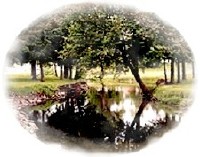 A brief history of the Pigeon River Area
A brief history of the Pigeon River Area
"The country about present day Clintonville was at
first called Pigeon, and included an undetermined tract of wild country drained by the
Pigeon River. The river was called Pigeon from the vast flock of wild pigeons that nested
in the region."
The general country, of which Pigeon is a part, had a name
given it by the Indians. This entire section, including the township of Larrabee and the
east part of Waupaca County with its teeming hunting grounds, lakes, and streams once
constituted the traditional home of the numerous and friendly tribes of the Potawatomi and
Menominee Indians. The first white man to enter this county was Alpheus Hicks, who,
in 1843, settled in what later became Waupaca County."
- Reference:
- Diedrich, Nicholas D. and John Britten Gehl. History
of Clintonville, Wisconsin; from pioneer days to the present time. 1937.
The First Settler
The first permanent settler in the community now known as
Clintonville, was Norman C. Clinton, in the spring of 1855. His son, U.P. Clinton, shared
with his father in the honors as founder, having previously made a trip thru this
territory as far as Shawano and having told his father of the splendid opportunity for a
dam at this point, its fine growth of pine, and other features.
The First Home-Builder
Merritt Lyon, although he did not permanently located on the
site of Clintonville, threw up a bark hut here in 1852 and was therefore the first
home-builder. Later the same shack was improved by that rare old character,
"Chet" Bennett, another of Clintonville's very prominent first settlers.
But to the Clintons must remain the credit for having founded
what is now Clintonville. They came here in the spring of 1855. Norman Clinton and his
wife, Lydia by oxen team, from Menasha, their previous home. Shoveling away the snow still
about two feet deep in the vicinity of the present Clintonville Mercantile store, they
built what was then called a brush pine, to live in. The ideas were gained from the
Indians and consisted of long forked poles, set up to meet at the top in such a manner as
to make a room. The poles, set close together, were then covered with hemlock boughs and
branches, shingled with the butts up so as to keep out the snow and rain. Boards for the
floor came from the boxes in which their few personal belongings were brought and a
blanket served as a door.
Clintonville Gets a Name
The first post office was established in Clintonville in 1858
with U.P. Clinton as postmaster. Before this the settlement was known as Pigeon and the
name of Clintonville came about in this way. U.P. Clinton was a friend of the register of
the land office who had visited Clinton in 1857. To repay Mr. Clinton for his kindnesss he
had U.P. Clinton appointed as postmaster. Not remembering the name of the place, he had
the commission addressed to "Clinton of Clintonville" and thru this operation we
ceased to be Pigeons and became Clintonvillians.
- Reference:
- Clintonville Tribune. 1934.
For more information, contact the Clintonville Area Historical
Society, Sandy Loberg at 715-823-4734 or John
Chapman at 715-823-2026.


 A brief history of the Pigeon River Area
A brief history of the Pigeon River Area